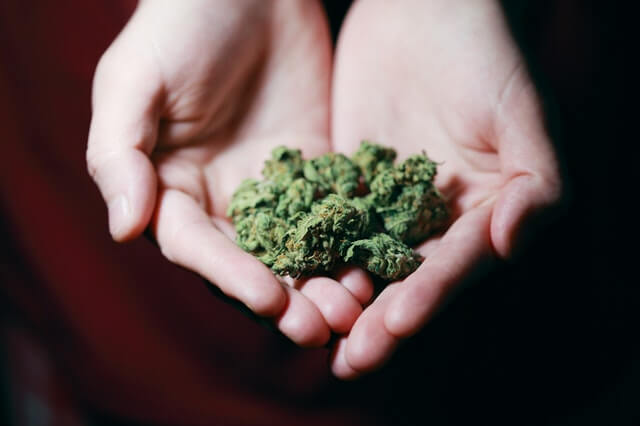Legalizing Marijuana: A Legal Debate

________________________________________________________________________________
This Blog is written by Oindrilla Bhattacharjee from St. Xavier’s Institution, Panihati. Edited by Prakriti Dadsena.
________________________________________________________________________________
INTRODUCTION
Marijuana, also known as weed, pot, reefer, joint, ganja, etc. is a psychoactive drug and used primarily for recreational and medicinal purposes. The scientific name of Marijuana is cannabis, as it is originated from the plant cannabis. Among the 483 known compounds in the plant, the main constituent is tetrahydrocannabinol (THC) and THC is the source of medicinal properties in cannabis or marijuana. For recreational purposes, it may be smoked as a cigarette, or in a pipe, or may even be added to food. Marijuana is primarily of three types, and by popular names, they are known as ‘ganja’, ‘charas’ and ‘bhang’, however, the third type is still legal in India, the first two remain illegal.
However in today’s world, cannabis is known to be used for recreational purposes or for ‘getting high’, most ancient cultures grew the plant as herbal medicine, likely starting in Asia around 500 BC. Cannabis was originally cultivated by the early American colonists who grew hemp for textiles and ropes. Political and racial factors in the 20th century caused marijuana to be criminalized in the United States (and in India), but now it’s legal status s changing in various places.
SIGNIFICANCE
It would be very wrong to consider cannabis as a hard drug as when compared to other drugs, its addiction rate is far less- 9per cent and its effects are not as serious as hard drugs, rather it comes with several proved medical benefits:
• A research by Ayush states that a restoratory drug can be produced from cannabis that might prove helpful for cancer.
• Beneficiary for serious diseases like arthritis, insomnia, multiple sclerosis, epilepsy and HIV
• Cannabis extracts lessen stomach aches and vomiting in people suffering from cholera and stomach problems
• Relief of chronic pain
• Improves lung capacity
• Helps lose weight
• Regulates and prevents diabetes
• Fights cancer
• Helps treat depression
• Shows promise in autism treatment
• Regulates seizures
• Mend bones
• Helps with ADHD/ADD
• Treatment of glaucoma
• Alleviate anxiety
• Slow development of Alzheimer’s disease
• Helps PTSD symptoms
• Helps with tremors associated with Parkinson’s disease
Apart from the medical benefits, if marijuana is legalized in India, it will provide tremendous economic benefits: Delhi alone will generate a tax of Rs. 7.25 billion and global cannabis market to reach US dollars 166 billion by 2025. In the words of Tathagatha Sathapaty, “There is revenue potential, and the government should not let that revenue out. Why keep a trade clandestine and loose on revenue? Rather keep it controlled, earn revenue, and ensure that there is the least misuse. Proper usage of medication and industrial usage should be allowed.”
After Delhi, Mumbai is the highest consumer of cannabis.
IMPACT
As mentioned earlier, the addiction rate of Marijuana is 7% and this rate rises to 17% among those who start young. When it is smoked, tetrahydrocannabinol (THC) rapidly passes from the lungs into the bloodstream, thus carrying the chemicals to the brain and other parts of the body. It increases dopamine and creates euphoria. People using the drug, when suddenly stops, show withdrawal syndromes like being irritable, having insomnia, losing weight, etc. Relapse is common.
Short term side effects of using cannabis are as follows:
- Increased heart rate
- Low blood pressure
- Muscle relaxation
- Slowed digestion
- Increased appetite
- Distorted perception
- Difficulty in thinking, memory, problem solving
- Loss of coordination
- Agitation, anxiety, confusion, panic paranoia
- Dry mouth, dry eyes
Long term usage causes:
- Cognitive deficits
- Schizophrenia
- Increased anxiety issues
- Bronchitis
- Pneumonia
- Respiratory Distress
Heart risk increases due to the usage of this drug.
After smoking marijuana, the bronchial passage relaxes and becomes enlarged. The smoke contains many of the same cancer-causing chemicals found in cigarettes, often in greater quantities. It contains cancer-causing nitrosamines, polycyclic aromatic hydrocarbons, vinyl chlorides, and phenol. Weed smokers have the same respiratory problems as cigarette smokers.
Combining marijuana with other central nervous system (CNS) depressant drugs causes drowsiness. The cannabinoids of marijuana can also affect liver enzymes and may alter blood levels.
STATUTORY PROVISION
It might be surprising to know that weed or marijuana was actually legal in India until 1985, and not only this but also India had been insisting the western countries, especially America, to keep marijuana legal since 1961, as since 1961, America had been campaigning to enforce a global law against all kinds of drugs and Indian officials opposed to that. In the year 1985, things went out of hand and the country had to surrender and the Rajiv Gandhi government banned it. In 1985, the Rajiv Gandhi government passed the Narcotics Drugs and Psychotropic Substances Act (NDPS), which in effect says that smoking marijuana is the same as shooting heroin. The main problem does not lie in marijuana is prohibited, but the problem is that it is also criminalized. Under Section 20 of NDPS cultivation of cannabis is punishable for 10 years and possession of weed is punishable for 20 years, along with a fine of one lakh rupees which may even be extended to two lakh rupees. Despite these laws, according to an article in India Today, cannabis is cultivated in nearly 60 percent, or 400 of India’s 670 districts and 31 million Indians consume cannabis.
Politicians like Meneka Gandhi and Shashi Tharoor want to legalize cannabis. In 2017, a Private Member’s Bill was produced to legalize marijuana. Ayurvedic companies like Patanjali expressed the requirement of cannabis in their products and Patanjali CEO, Bala Ramakrishnan has said that the country is deprived of a business opportunity by criminalizing cannabis.
WHY SHOULD CANNABIS BE LEGALISED IN INDIA?
1. According to a journal by scientific Reports, cannabis is the safest drug available and it is 114 times safer than alcohol.
2. In Colorado, after legalizing marijuana, there has been a decrease in crime rates. Crime has fallen by 15 percent and murder has fallen by 50 percent. This is because crimes related to illegal trades and black market cultivation is reduced.
3. As stated earlier, marijuana can kill cancer cells. It is also confirmed by the US government.
4. Can help with the most serious types of brain tumors.
5. It is even less addictive than coffee.
6. Other medicinal benefits as stated above
7. Would release the economy, as explained earlier.
8. Legalising weed would create jobs. It would employ people in the weed industry.
9. A proven decrease in teen marijuana use.
LEGALISATION OF CANNABIS IN OTHER COUNTRIES:
As of January 2017, eight states- Alaska, California, Colorado, Maine, Massachusetts, Nevada, Oregon and Washington and the District of Columbia allow the recreational use of marijuana in addition to the permission of usage of medical marijuana.
As of November 3, 2020, 13 states legalized marijuana for recreational purposes, and 35 US states, the District of Columbia, Puerto Rico, and Guan now legally allow marijuana for personal medical use. Rules surrounding the use of medical marijuana vary from state to state. Marijuana is now legalized in Canada as well.
ANALYSIS
When we analyze the advantages and disadvantages of the drug, we may come to the conclusion that, whereas the negative effects of cannabis are almost as same as that of cigarettes, the advantages are way more important and cannot be found in any other addictive drug. Therefore, when cigarettes are legal why not cannabis? Also, even if not for recreational purposes, India should at least decriminalize and legalize the trading of marijuana in the country just for medicinal purposes. Even if the government does not legalize the drugs, the least they can and must do is to actually reduce the punishment under Section 22 of NDPA to a great extent because production and consumption of a substance which was not only once legal in the country but also was banned by not by the country’s own decisions but by outer pressures should not be punishable for a decade or more. Considering the current economic crisis, legalizing cannabis will contribute a great help in reviving the country’s economy. For safety reasons, restrictions on the amount of purchase and sale may be imposed; however, the restrictions should not be so strict that it would cause illegal trade.
CONCLUSION
In conclusion, we may say that after looking into every aspect, the government should definitely legalize marijuana in India as even the western countries, under whose pressure it was banned in India, are recognizing the benefits of cannabis and legalizing them and so should India. People who are against legalizing of cannabis are surely unaware of its positive consequences and need to be enlightened. Sure it does have negative consequences, but those are treatable, not that serious, and in most cases does not even occur, and in every case, not at par with the positive impacts.
REFERENCES:
(2) Dentalcare.com
(3) Drugs.com
(4) Lawyered
(5) metro.co.uk
(8) TheDeshbhakt


Very well written. Keep blogging n’ expressing yourself.
😍 thank you!